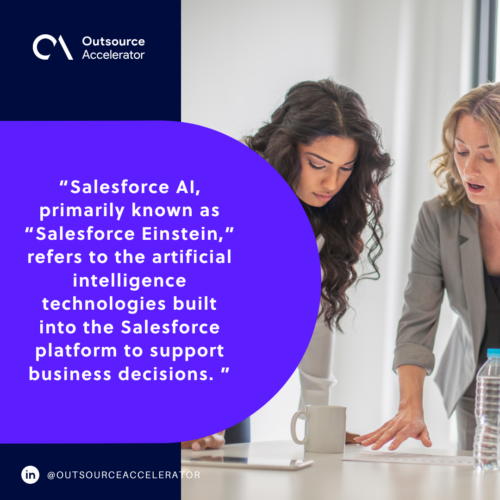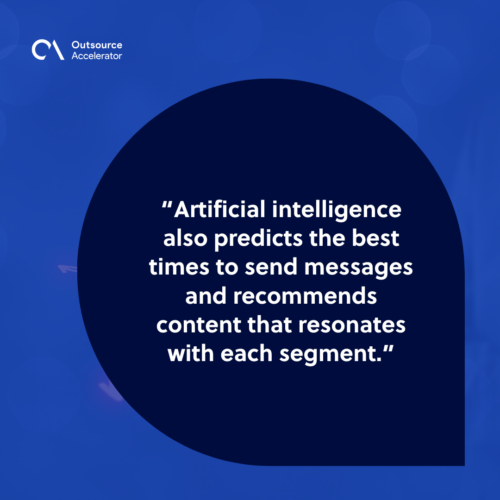Salesforce AI examples and use cases

Artificial intelligence is transforming how businesses operate, unlocking new levels of efficiency, speed, and insight across every industry.
A 2024 McKinsey report found that companies using AI in their workflows saw a 40% boost in productivity and a significant reduction in decision-making time. With digital demands growing, integrating AI into daily operations is no longer optional; it’s critical for staying competitive.
That’s where Salesforce comes in. Known for driving customer success, the platform has embedded powerful Salesforce AI capabilities into its platform to help organizations work smarter, make better predictions, and personalize customer experiences at scale.
Whether you’re in sales, marketing, service, or commerce, Salesforce AI provides the tools needed to adapt quickly and grow even faster.
In this blog, we’ll break down Salesforce, explore its standout features, and delve into real-world use cases that demonstrate how businesses are leveraging it to lead in the era of intelligent technology.
What is Salesforce AI?
Salesforce AI, primarily known as “Salesforce Einstein,” refers to the artificial intelligence technologies built into the Salesforce platform to support business decisions.
This innovation utilizes machine learning, predictive analytics, and natural language processing to enable organizations to derive meaningful insights from their data.

Unlike traditional tools that rely on manual input and static reports, Salesforce AI processes large volumes of data in real time. It allows teams to uncover patterns, identify trends, and act with greater confidence.
The goal is to make data more accessible and actionable across departments, from sales to customer service. Users work more efficiently and respond faster to changing business needs as Salesforce embeds AI into its ecosystem, empowering their capabilities.
Salesforce Einstein serves as a key driver in helping companies adapt to a fast-moving digital landscape.
4. Essential features of Salesforce AI
Salesforce AI offers a powerful set of tools designed to help businesses work smarter and faster. Built directly into the Salesforce platform, these features use artificial intelligence to support decision-making, automate processes, and personalize user experiences.
Below are the vital components that make up Salesforce AI:
1. Einstein AI
Einstein AI serves as the foundation of Salesforce’s intelligent capabilities. It analyzes business and customer data to deliver predictive insights that help teams make informed decisions.
Einstein AI also suggests next steps and automates routine actions, allowing users to stay focused on high-value work.
2. Einstein GPT
Now part of the broader Einstein platform, Einstein GPT adds generative AI to the mix. It can create personalized emails, generate summaries from meeting notes, and even write code.
This feature helps teams save time while producing tailored content that drives engagement and results.
3. Agentforce
Agentforce brings AI-powered automation to the workforce. This platform uses intelligent agents to perform a wide range of tasks, including customer service responses, sales assistance, and content creation.
Agentforce boosts productivity and allows teams to scale efficiently, as it reduces manual work.
4. Einstein Trust Layer
The Einstein Trust Layer is crucial in integrating responsible AI use. It provides tools and guidelines to protect data privacy and promote transparency.
This layer enables businesses to adopt AI with confidence by maintaining control over how data is used within the Salesforce ecosystem.
Together, these features form the backbone of Salesforce AI. They support intelligent decision-making, streamline workflows, and help organizations deliver more personalized experiences, all while maintaining a strong focus on trust and data security.
Salesforce AI examples and use cases
Salesforce AI is refining how businesses operate by augmenting everyday tasks, making them faster, and more effective. From sales and customer service to marketing and commerce, Salesforce AI offers practical tools that help teams deliver better results.
Here we have examples and use cases across different departments:
Sales
In sales, Salesforce Einstein helps teams connect with the right prospects and close deals more efficiently. AI tools can generate personalized email content, saving time and improving engagement.
After sales calls, it can automatically produce summaries that highlight important points and follow-ups. AI also analyzes customer data to identify high-potential leads, allowing sales reps to focus on the most promising opportunities.
Service
Customer service teams utilize Salesforce AI to resolve issues efficiently and provide superior support. AI-powered chatbots handle simple inquiries, while agents receive AI-suggested replies and case summaries to speed up resolution times.
It also prioritizes cases based on urgency or sentiment, helping teams respond more effectively. This improves customer satisfaction while reducing response times.
Marketing
Salesforce AI supports marketers by helping them deliver the right message to the right audience. It uses customer behavior and data trends to build personalized campaigns that drive engagement.
Artificial intelligence also predicts the best times to send messages and recommends content that resonates with each segment. This leads to higher conversion rates and more meaningful customer interactions.

Commerce
In the Commerce Cloud, Salesforce AI enhances the online shopping experience. It recommends products based on browsing history, previous purchases, and real-time behavior.
It also powers personalized search results, making it easier for customers to find what they need. These features not only improve the user experience but also increase sales and customer loyalty.
These use cases demonstrate how Salesforce AI delivers tangible value across departments, enhancing business operations and personalizing customer experiences.







 Independent
Independent




